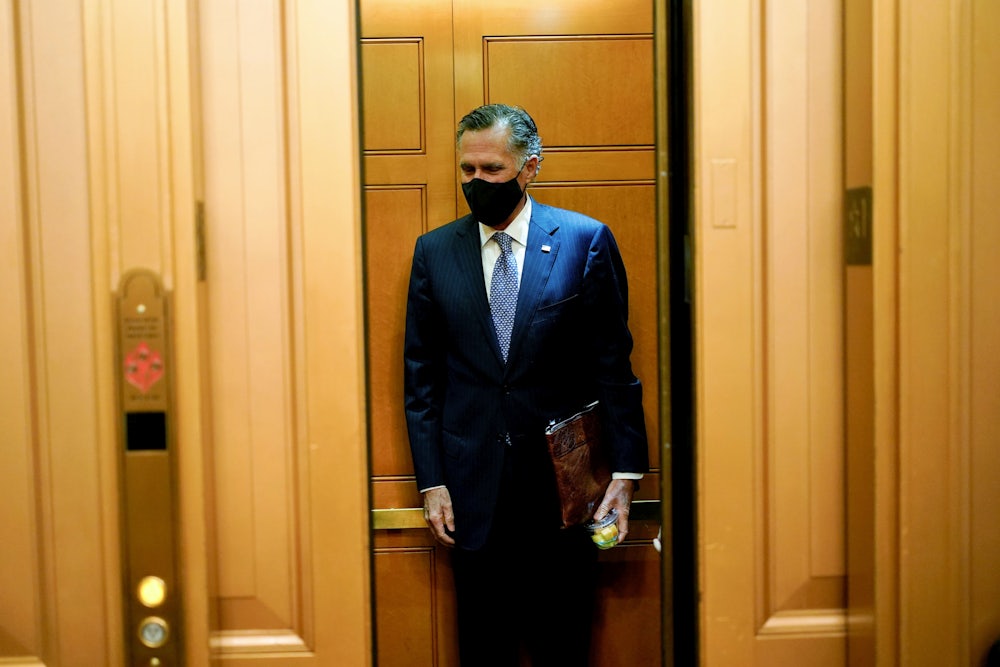Little has changed in the year or so spanning the two impeachments of Donald Trump. His second trial, which began Tuesday, will likely be swiftly decided, this time to spare legislative bandwidth rather than presidential embarrassment. The former president is almost certain to be acquitted, as he was last January. And once again, Mitt Romney will be the man to watch in the jury box.
Utah’s junior senator hasn’t yet announced his intentions, but he already voted against a GOP resolution that would have voided the possibility of a trial. Romney was the lone Republican senator to break ranks last year, when the case against Trump was limited to an untoward phone call with a foreign leader; egging on a crowd to lay siege to the Capitol, after two months of agitating to overturn the results of a free election, was a kind of sequel to that unpunished offense, as if O.J. Simpson had walked free only to murder JonBenét Ramsey. The smart money is that Romney votes to convict a second time.
There is something quite unexpected, however, in his willingness to defy the would-be legacy of Trumpism. As we see from his recent pitch to create a child benefit program that would be more generous, in some respects, than President Biden’s own proposal, this stance extends beyond anti-Trump animus to encompass policy, as well. Eight years after winning the Republican presidential nomination, Romney appears willing to govern, if not like a conservative Democrat, then a bit like John McCain during his walkabout phase in the early 2000s.
By acting as the public ambassador of the post–Never Trump movement—perhaps their appellation henceforth will be “Never Again”—Romney has addressed himself to the two unsettled questions of his political career.
The first is why he’s even making the effort. In previous campaigns, beginning with his 1994 effort to unseat Ted Kennedy, Romney affected a certain disdain for politics and its grubby inducements. Like all novice candidates, Romney was a self-styled outsider, but his uncountable fortunes and indomitable coif enhanced this profile, virtually screaming to the likes of Newt Gingrich and Mike Huckabee: I don’t really need this.
Naturally, the main reason he could boast of not being a “career politician” was that he kept losing elections—to Kennedy, McCain, and finally Barack Obama. By the time he stirred himself to run for Senate, he could no longer plausibly deny his ambitions; when you willingly subject yourself to cross-country flights for the honor of casting a cloture vote, your vocation is clear.
Romney has made as many burnt offerings as necessary to the gods of the American Right, even forsaking his own universal health care program as the cost of transforming himself from Massachusetts squish to post-Bush conservative. He’s since pulled off the greatest carpetbagging job since Bobby Kennedy, decamping to one of the reddest states in the country to reenter political life. Such stratagems make it all the more puzzling that he has now flitted back to the Rockefeller wing of the Republican Party, likely as a caucus of one.
Very few figures in modern American politics have found themselves so estranged from the mainstream of their party so soon after serving as its standard-bearer. Romney’s closest antecedent might be Joe Lieberman, who went from a place on the Democratic ticket in 2000 to flailing as a presidential contender in 2004 to losing his own Senate primary a few years later. In terms of party nominees, perhaps only George McGovern found himself as isolated as Romney is now.
All of which raises the second, related question of whether he’s any good at politics. All those Ls—getting pasted by McCain and not being offered a V.P. slot, dropping the Iowa caucus to Rick Santorum in overtime, even ducking a gubernatorial run against Deval Patrick when it was apparent he couldn’t win—seem to suggest not. And yet he has done things few could have imagined possible in 2002, when he won his first race. It’s not exactly easy to get elected as a Republican in Massachusetts, and it’s damned hard to rebrand, midcareer, and seize a major party nomination.
If we allow that Romney, a senator and former governor, is actually a skilled politician, it is still fair to wonder whether he has overplayed his hand by antagonizing the Trumpist faction to this extent. His forthright condemnation of their idol in recent weeks has won him the loathing of national Republicans, and the polling isn’t much better in Utah, where he will next face the voters in 2024. As a reminder, Tea Party activists ousted the popular Republican Senator Bob Bennett in 2010 by uniting behind ultraconservative Mike Lee at the state party convention. Romney himself fell short at the 2018 convention, though he prevailed in a subsequent primary.
Already he has committed his share of apostasies during the Trump era, condemning the Senate candidacy of Roy Moore and marching with Black Lives Matters protesters last summer. But the game will become more dangerous if he positions himself as a post-Trump free agent in order to achieve policy victories, as in the case of his family benefit rolled out last week. In a chamber where Democrats hold the barest of majorities, the temptation to trade votes and play kingmaker will be significant, especially for a man who has been left for dead so many times.
His situation is remarkably similar to the one his father, George Romney, faced half a century ago. Ideologically limber and perpetually on the make, the three-term Michigan governor also sought the national stage during a period when the GOP was tearing itself apart. In his own time, conservative mutineers like William F. Buckley and Barry Goldwater threatened to wrest control of a party that moderates had dominated since the New Deal. That movement, which eventually hardened into a formidable coalition, has been rocked by insurgent waves over the decades; now Trump and his followers could once again refashion it into something very new.
The elder Romney undid himself fighting the Right. After he withheld his endorsement for Goldwater’s doomed presidential bid in 1964, his own prospects in 1968 were permanently scarred. Republicans in Congress lined up instead behind Richard Nixon, who had led them to a huge midterm surge and better understood how to conduct the symphony of American grievances. After a labored campaign, he was allowed into Nixon’s Cabinet as secretary of housing and urban development, nobly pursuing an agenda of desegregation without seeming to recognize that his boss was undercutting his every step.
Mitt Romney has perhaps come to understand that, at the end of a substantial career in politics, his remaining purpose is to deny the GOP its Trumpist turn to conspiracy-brain and ethnic revanchism. He has likewise shown the electoral skills to broker a genuine legacy in public policy. The final question—an agonizing one for someone who has found his place in national politics at last—is what it will cost.








